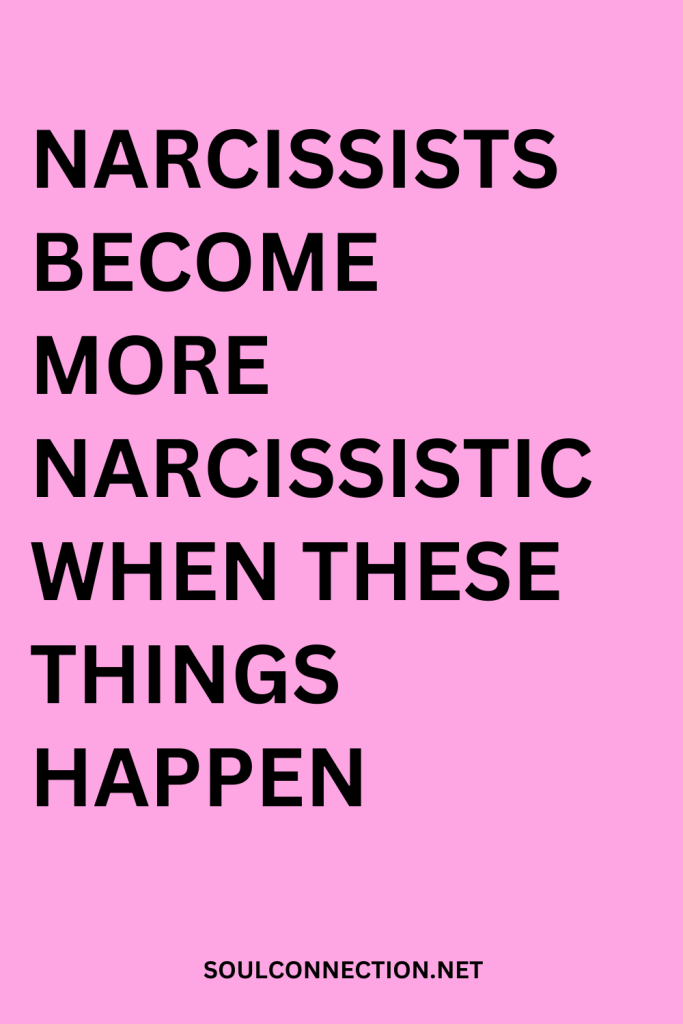Narcissists can turn up the self-absorption faster than you can say “mirror selfie.”
Living with or loving someone with narcissistic traits is like trying to pet a cat that only wants attention when it’s convenient—except the cat also critiques your life choices.
Some days, you catch glimpses of charm and warmth; other days, the ego inflation rivals a hot air balloon festival. But have you noticed how, at certain moments, their narcissism seems to go into turbo mode? It’s not your imagination.
Welcome to the not-so-enchanting hour, when narcissists crank things up a notch.
Here’s what really triggers an increase in their narcissistic behaviors—and more importantly, how you can stay sane when the self-obsession dial gets stuck on “maximum.”
Criticism Hits Home
Nothing spikes narcissism faster than good old-fashioned criticism. Whether it’s a gentle suggestion or a full-blown roast, narcissists hear, “You’re worthless,” even when you’re just pointing out that their lasagna could use more salt.
When their veneer of perfection is threatened, defenses snap into place. You might see a sudden shift: the charming mask slips, and out comes the grandiosity, blame-shifting, or even downright rage.
Suddenly, you’re not just discussing underseasoned pasta—you’re accused of sabotaging their culinary legacy.
What works? Keep feedback brief and focused on the behavior, not the person.
If you’re met with denial or attack, it’s not about you; it’s about their inability to tolerate imperfection. Don’t get sucked into the vortex.
Someone Else Steals the Spotlight
Narcissists thrive on attention the way sunflowers chase the sun.
When someone else is center stage—whether it’s a sibling’s promotion, your best friend’s engagement, or a neighbor’s viral TikTok—the narcissist in your life might react with envy, sabotage, or a sudden need to recount their own “even better” accomplishments.
You might notice dramatic stories, abrupt mood changes, or even attempts to undermine the success of others. Anything to yank the spotlight back.
How to cope? Shower praise on others anyway. Model what healthy support looks like. And if your partner starts competing with your grandma’s Bingo winnings, feel free to roll your eyes (privately).
They’re Put in a Position of Power
Hand a narcissist a little bit of authority, and suddenly you’re living with a dictator—minus the funky military uniform. Whether it’s being named team lead or simply winning an argument, power boosts their sense of superiority.
The result? Less listening, more lecturing. More demands, fewer compromises. You might notice increased micromanagement or a sudden urge to “correct” everything from your driving to your pronunciation of quinoa.
Managing this? Set clear boundaries. Refuse to be bossed around at home just because they got a fancy new title at work. Remind yourself that your worth isn’t measured by their approval rating.
They Experience a Blow to Their Ego
Narcissists protect their egos like they’re the crown jewels. Any setback—rejection, failure, or even a perceived slight—can trigger a tidal wave of defensiveness.
Expect blame games, victimhood, or wild attempts to re-frame reality (“That job wasn’t good enough for me anyway!”).
You might see them rewriting history to cast themselves as the hero, or lashing out at those closest to them because it’s safer than admitting vulnerability.
Best bet? Offer empathy, but don’t get tangled in their need for constant reassurance. Remember, you didn’t cause their disappointment, and you can’t fix it for them.
Social Media Offers a New Stage
Social media is like rocket fuel for narcissists. Likes, comments, and followers offer instant validation, and the temptation to curate a flawless persona is almost irresistible.
Watch for an uptick in humblebrags, selfies, and dramatic posts when they feel insecure or ignored offline. If someone else gets more digital love, brace for peacock-level displays or passive-aggressive status updates.
Don’t feel pressured to compete or validate every post. If it gets too intense, step back from their online circus and invest energy in your own offline connections.
The Relationship Feels Threatened
A whiff of romantic competition or abandonment can trigger a surge of possessiveness, manipulation, or desperate love-bombing. Narcissists need to feel special and irreplaceable; if that’s at risk, they’ll dial up the charm—or the drama.
Flirtation from others, an innocent work friendship, or you simply enjoying your own interests can make them feel threatened. The result? Jealousy, accusations, or sudden over-the-top declarations of devotion.
Keep your social life healthy and strong, and resist the urge to shrink your world just to placate their insecurity. You’re allowed your own friends, hobbies, and space.
They’re Surrounded by Yes-People
Every narcissist dreams of their own personal fan club. Surrounded by admirers or people who never challenge them, their self-importance balloons.
The more they’re worshipped, the less they see any need for self-reflection or empathy.
This can lead to bolder bragging, bigger demands, and a total disregard for others’ needs. Suddenly, you’re living with a legend in their own lunchtime.
If the crowd is unavoidable (family gatherings, work events), keep interactions light and steer clear of public confrontations. Save serious discussions for private moments.
Big Life Events and Milestones
Birthdays, weddings, graduations, and even funerals can turbocharge narcissistic behaviors. These occasions are ripe for attention-seeking and story-stealing.
You might watch them hijack a toast, make someone else’s achievement about themselves, or even create drama just to re-center the action. Subtlety isn’t the strong suit here.
If you’re hosting or attending a big event, manage expectations. Don’t expect gratitude for sharing the limelight.
And if they turn your cousin’s baby shower into a tribute to their own childhood, keep it classy and resist the urge to throw cake.
Boundaries Are Set
The mere suggestion of boundaries—no matter how reasonable—can send a narcissist into a tailspin. Limits are seen as personal attacks, and you might be met with guilt trips, anger, or icy withdrawal.
You’ll hear, “You’re so controlling!” or, “Why are you doing this to me?” when really, you’re just asking for an hour of alone time or a little respect for your privacy.
Hold your ground. Repeat your boundaries calmly and consistently. Their reaction is not your responsibility, even if they act like you’re denying them oxygen.
The Narcissist Is Exposed
Few things enrage a narcissist more than being publicly called out for bad behavior.
When someone finally points out the emperor’s lack of clothes, you might witness epic defensiveness, smear campaigns, or a sudden switch to self-pity.
Expect denial, gaslighting, or attempts to rally support by playing the victim. The goal? Protect their fragile self-image at all costs.
Your best move is to avoid public shaming; it rarely leads to insight or change. If accountability is needed, keep it private, direct, and as drama-free as possible.
What To Do When Their Narcissism Spikes
Spotting these triggers is one thing, but handling them without losing your own marbles is another. Here’s a little toolkit:
- Set boundaries and stick to them, even if you get pushback.
- Stay calm and refuse to match their drama with drama.
- Seek support from friends, family, or a therapist who gets it.
- Don’t take their behavior personally—what you’re seeing is their struggle, not your failure.
Above all, mind your own well-being. You deserve connection, respect, and peace—yes, even if you share a bathroom with an aspiring diva.
Staying Grounded When Ego Runs Wild
Watching narcissistic behavior escalate is draining, no two ways about it. Yet the more you understand what flips the switch, the stronger you become in protecting your own happiness.
You can’t control their reactions, but you can keep your boundaries sturdy and your sense of humor handy. And when you need to, step away, phone a friend, or treat yourself to a cuppa—no drama required.
After all, you’re not living in someone else’s reality show.
You’re writing your own story—one that leaves plenty of room for self-respect and, ideally, less unsolicited karaoke from the peanut gallery.


